State Officials Celebrate $49 Million Tech Hub Investment
Sen. Baldwin and Gov. Evers visit MATC to tout huge impact on state's jobs and economy.
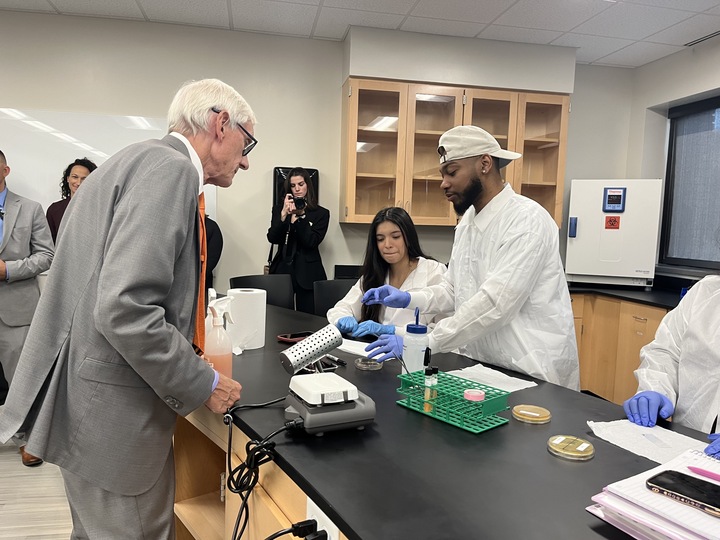
Gov. Tony Evers tours a microbiology classroom at MATC. Photo taken July 22, 2024 by Sophie Bolich.
In early July, state officials celebrated a $49 million federal grant for Wisconsin’s Biohealth Tech Hub, which promised to create thousands of new jobs and a statewide economic boost throughout the coming decade.
On Monday, those same officials visited Milwaukee to meet with students poised to play a major role in that development, filling a burgeoning number of positions in the personalized medicine and biohealth sector.
“Simply put, this is a once-in-a-generation investment for Wisconsin,” said Senator Tammy Baldwin, who publicly advocated for the grant for the past two years.
The CHIPS and Science Act funded the grant, which was administered by the U.S. Economic Development Administration (EDA).
“For anyone who knows Wisconsin, manufacturing and innovation are key to our identity,” Baldwin said. “We have world class research and education institutions, a second-to-none skilled workforce and a proud legacy of manufacturing. This tech hub designation will grow our state’s personalized medicine and bio health sector and really move the needle on how people get health care.”
Governor Tony Evers and other partners in the tech hub coalition, led by BioForward Wisconsin, accompanied Baldwin on a tour of Milwaukee Area Technical College’s (MATC) workforce training facility.
The group observed a microbiology class, viewed various tools and machines used in medical procedures and discussed long-term effects of the investment.
Evers called the designation “a pivotal moment” for the state, touting the economic possibilities of the multi-million dollar grant.
“As it stands, the tech hub is projected to bring more than 30,000 jobs to the personalized medication sector, over 111,000 indirect jobs attributed to the tech hub and $9 billion in economic development in the first 10 years of this project,” he said. “New opportunities to advance research and innovations will drive our competitive advantage in the industry.”
The Wisconsin partnership includes organizations in Madison and Milwaukee in the private, public and nonprofit sectors, and is planned to work across three areas: imaging/theranostics (cancer diagnosing and treatment), genomic and big data/analytics.
Sheldon Garrison, a research scientist at MATC, noted “several different careers” that will be supported by the grant, including positions in the fields of radiology, biotechnology, CNC manufacturing and technology.
“We’re hoping that this award opens the doors for students — really gets people in those great paying jobs,” he said. “That is going to make a difference for not just employment in Wisconsin, but for the patients that desperately need this advancement and health care that the future employees will help to provide.”
Organizations in the partnership include the Wisconsin Economic Development Corporation, the University of Wisconsin System Administration, UW-Madison, GE HealthCare, Rockwell Automation, Exact Sciences Corporation, BioForward Wisconsin, Employ Milwaukee, Accuray, Plexus, WRTP/BIG STEP, Milwaukee Area Technical College, Madison Area Technical College, the Madison Regional Economic Partnership and M7.
Wisconsin is one of 12 tech hubs across the country to be designated for the final designation and funding.
MATC President Anthony Cruz, now entering his second week in the new role, said the grant will create “transformative change” for the community. “This indeed is a landmark moment for this area, for the state and for this institution.”
According to an EDA fact sheet, grant funding will be distributed among five projects: the creation of a data ecosystem to accelerate biohealth product development; the deployment of mobile cancer screening and healthcare referral fleets in underserved communities; the use of AI and data techniques to integrate new technologies; developing a workforce skilled in the components of the new technologies; and “synergizing initiatives” throughout the hub.
“For over a century, Wisconsin’s technical colleges have been well known to be expertly equipped to fulfill the workforce training needs of our state’s employers. It’s in our — no pun intended — DNA,” said Mark Thomas, chief strategy officer and executive vice president of Madison Area Technical College.
He added that the grant will not only boost outreach to entry-level workers, but also support incumbent workers and provide “earn and learn” opportunities to those facing financial barriers to education.
Lisa Johnson, CEO of BioForward Wisconsin and Lindsay Blumer, CEO and President of the Wisconsin Regional Training Partnership/Building Industry Group & Skilled Trades Employment Program were also in attendance at Monday’s event.
Milwaukee is also in the running for a separate federal grant of $50 million that would help bring advanced manufacturing jobs to the 30th Street Corridor.
Northwest Side Community Development Corporation is the lead applicant for “Grow Milwaukee Recompete Coalition Plan,” which is one of 22 finalists for the EDA’s Distressed Area Recompete pilot program.
Photos
Speakers
If you think stories like this are important, become a member of Urban Milwaukee and help support real, independent journalism. Plus you get some cool added benefits.


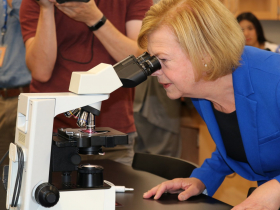
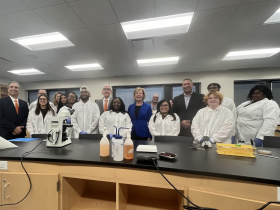
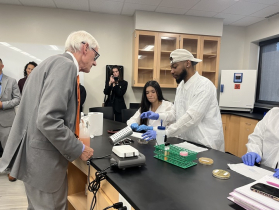
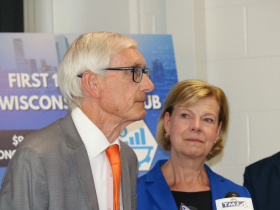
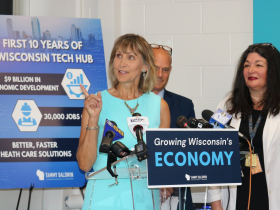
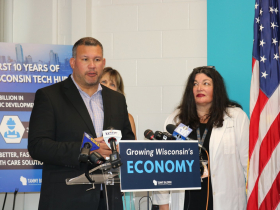
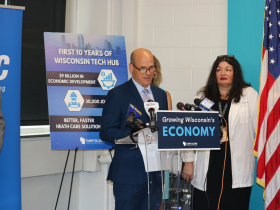
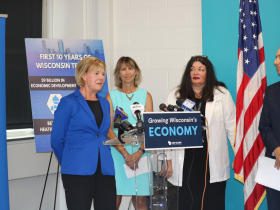
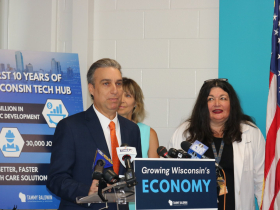


















This Tech Hub Investment is precisely the type of development that grows our economy, provides not just jobs but careers, and helps everyone participate at many levels in emerging industries. The blend of technology, biology, and computer science is part of the emerging future of the fourth industrial revolution. Milwaukee was at the heart of the revolutions and innovations in manufacturing in the late 19th and early 20th century as “the machine shop of the world.” Now, Milwaukee’s people and institutions can build on that. We are so fortunate to have leaders like Senator Tammy Baldwin, Governor Tony Evers, MATC President Anthony Cruz, and others leading the decision-making process for the tough work to make this happen. As voters wonder if they should vote, they can look to vote for the people who build for future generations grounded in education and research. Participation in innovation and entrepreneurship gives people lifetime goals with accomplishments that meet and then surpass the practical, kitchen-table issues that voters often seem to talk about. This project is an example of the choices voters have all the time: Voters can support the leaders who work to unleash this innovation and add positively to our communities.